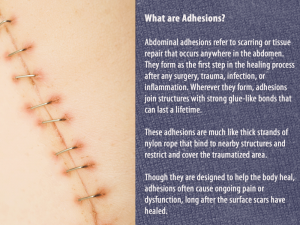Simple answer? Yes, it is possible to have been misdiagnosed for irritable bowel syndrome (IBS) after surgery. If you have had abdominal surgery in the past and now have persistently stringy stool (pencil-thin, narrow, or yarn-like poop) accompanied by abdominal pain, you may be diagnosed with irritable bowel syndrome (IBS).
Anyone misdiagnosed with IBS will likely find no relief with IBS treatment and may consequently experience emotional stress, which can then be misdiagnosed as depression or anxiety. This snowball can get even bigger, leading to more adhesions and other digestive complications later on.
If you suspect your IBS diagnosis is not accurate, it is important to trust your own perceptions and tell your doctor that you would like to keep on seeking answers.
What causes stringy poop and abdominal pain?
There is no specific test to definitively diagnose IBS because its symptoms can be similar to symptoms of some other problem.
Other causes of stringy poop and abdominal pain
Doctors can also misinterpret other causes of abdominal pain. Normal bowel movements produce stool that is one to two inches in diameter, while irregular bowel movements can include:
- loose stool
- constipation which happens from time to time for a variety of reasons, including:
- insufficient fiber
- not enough exercise
- stress or anxiety
- pregnancy
- hormone imbalances
- viruses
- food poisoning
- medications
Even with these, one often-overlooked yet very common  problem is abdominal adhesions.
problem is abdominal adhesions.
These bands of scar-like tissue attach to organs, muscles, and other structures and can constrict the intestines and cause various symptoms, including stringy stool and abdominal pain.
Why are abdominal adhesions ignored as a diagnosis over IBS?
Many healthcare providers are not aware that stringy poop and abdominal pain in people who have had abdominal surgery may be caused by abdominal adhesions, even though abdominal adhesions are very likely to form following any type of abdominal surgery. This situation is especially true for women. An exhaustive study examining five decades of surgery showed that more than 90% of patients develop adhesions following open abdominal surgery and 55% to 100% of women develop adhesions after pelvic surgery. (Liakakos et al., 2001)
Like IBS, abdominal adhesions are a very real gastrointestinal condition; however, abdominal adhesions can be life-threatening. A definitive diagnosis for abdominal adhesions can only be accomplished two ways:
- by performing scans while the patient is actively experiencing a bowel obstruction
OR
- by performing surgery and viewing the adhesions directly
- Note: This surgery causes more abdominal adhesions
Abdominal adhesions cannot be diagnosed with lab tests, and in most cases, they will not show up on scans.
Wrongly diagnosed IBS and its treatments can do more harm than good
For people who have stringy poop, abdominal pain, and other symptoms caused by abdominal adhesions, treatments for IBS can actually make symptoms much worse. One normal treatment option for IBS with diarrhea includes dietary changes that increase soluble fiber to slow down stool passage. However, for people who have stringy poop, abdominal pain, and other symptoms caused by abdominal adhesions, treatments for IBS can actually make symptoms much worse. As such, fiber supplements or fiber-rich foods that cause stool to bulk can be a real problem and increase the risk of bowel obstruction or make a partial bowel obstruction become a total bowel obstruction.
Additionally, because of the glue-like bonds of abdominal adhesions, certain types of exercise and medications or supplements for IBS treatment that stimulate the digestive system can result in nightmarish levels of pain.
Why Clear Passage Therapy is your best bet
Not only is decreasing or eliminating abdominal adhesions without surgery a possibility, but it is also a probability, with Clear Passage Therapy, (CPT). This treatment, although non-traditional, is not some experimental quackery. It is the leading form of soft tissue treatment that removes adhesions or scar tissue. Scientific results have been published in trusted, peer-reviewed medical journals demonstrating the effectiveness.
Here’s how Clear Passage Therapy works.
With CPT, highly trained and certified physical therapists use their hands and fingers to pull apart adhesions non-surgically, like pulling apart the run in a three-dimensional sweater or pulling out the strands of a nylon rope. Although the treatment is sometimes referred to as a massage, it is more of an intensive, deep-pressure, soft-tissue physical therapy.
Unlike surgery, this therapy does not appear to create new adhesions, which is a major advantage for anyone who suffers from abdominal adhesions.
Walk in or call today!


